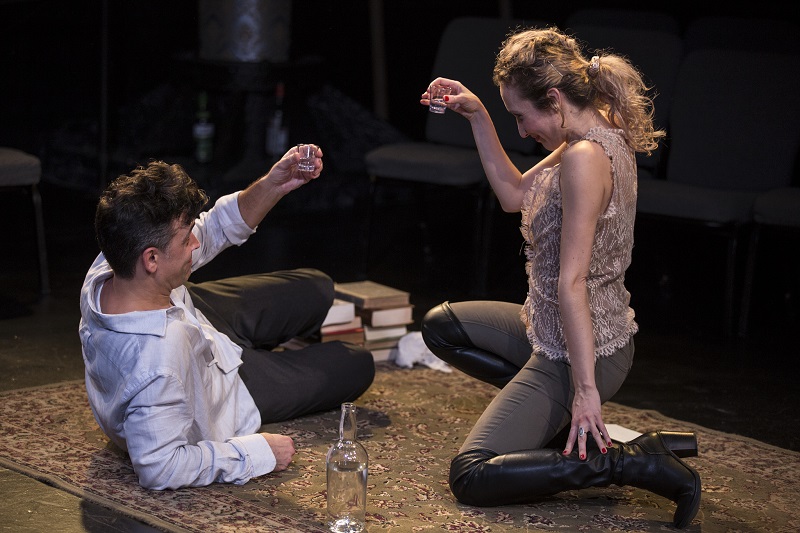Penned at great length when the writer was just 18, Chekhov’s Platonov (never formally titled) was rejected by the actress for which it was written and not produced or published in the author’s lifetime. Yet it prefigures the themes and characters of the later plays, a poetic amalgam of fumbled suicides, frustrated loves, threatened estates, country doctors, school teachers, dead or absent patriarchs, indolence, alcoholism, and historical change. It has been staged rarely, out of necessity cut and otherwise adapted. I have seen it on film (the wistfully lyric Unfinished Piece for Player Piano), but not, until now, in the theater.
Blessed Unrest’s production reminded me as much of Caryl Churchill as of Chekhov, its potent politics accentuated by gender swapping and race neutral (but aware) role playing. In some ways the casting choices give the play its politics, which are at best unconscious in the original. The story of a schoolteacher, Platonov, with whom four women are in love, feels like an unmoored patriarchy veering toward shipwreck. That gender and race are as up-in-the-air as who loves whom turns lyrical comedy into high-spirited historical farce. Blessed Unrest does with Chekhov’s fading aristocracy what Churchill’s Cloud 9 did to the slow violent end of British colonialism.
Of a nimble cast of six, four double in male and female roles. Only Platonov and Anna, a widowed landowner, have stable identities, but to be on the axis of a world so deconstructed is wobbly indeed. He, incapable of the choice before him, descends into alcoholism and despair, the necessary note of clueless desperation struck by Darrell Stokes’ deliberately non-descript airs. She, on the other hand, destabilizes the received world with zeal and confidence. Irina Abraham ignites Anna like a stick of revolutionary dynamite, lanky and assertive, dangling defiantly over emotional precipices, more the protagonist than Platonov. Platonov’s title is conventional, after all, and its subtitle here is “A Play with No Name”.
Of the other four, Ashley N. Hildreth, as Anna’s diminutive stepson and Platonov’s wife Sasha, is the most fully in drag, with a red velour jacket as the former and oversized sensible shoes as the latter, an aptly indeterminate and often hilarious performance. Someone invented “aplomb” to describe the marked intelligence with which Becca Schneider took turns as Sofya, Sergei’s wife, and Osip, a gun-toting lowlife. The requisite Chekhovian serving woman and (male) doctor are played with nervous cleverness by Taylor Valentine in a babushka and an almost ill-fitting suit. Javon Q. Minter doubles as Porfiry and Mariya, making one wonder what exactly the difference is between, as they are respectively described, “a romantic neighbor” and “a passionate student”. Some of the actors’ names and even middle initials add to the ambiguity of identity that pervades the production.
Sarah Thea’s costumes, with their broad strokes and quick changeability, have a lot to do with pulling all this off. The wondrously effective in-the-round staging is well-supported by Ken Bzhelyansky’s set, pared down and atmospheric, facilitating rapid, minimalist scene changes. Books and vodka bottles are spread about the pillars and risers of the theater under pools of light created by Miriam Nilofa Crowe. Unlike the play, they have given titles that are fun to browse before or after the show. There are pertinent histories, a memoir of communism’s fall, the works of Plato (a distant namesake, one assumes, of Platonov), books of fiction and also of fact.
How much of the production’s distinct character is attributable to Jessica Burr’s direction or the translation and adaptation by Laura Wickens is hard to know. A published version of the script ought at least to suggest the possibility of double-casting across gender and race; it is the source of much of the comic energy and dramatic interest. The strands of the plot could be more clearly marked (I’m not sure I caught it all or accurately), but the choice to veer toward farce is one Chekhov would likely approve. This is a gutsy, high-velocity production that resonates with both the age of the author and our own, whether the subject is gender, guns, class, or the desire for meaning, which is perennial.
PLATONOV continues through March 11 at the New Ohio Theater. For tickets and information click here. Photo credit: Maria Baranova.
